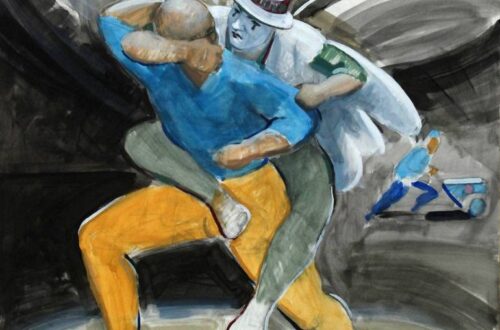-
James 3
1. Let’s look at the first and last verses of this chapter. They serve as bookends. “Not many of you should presume to be teachers, my brothers, because you know that we who teach will be judged more strictly. We all stumble in many ways. If anyone is never at fault in what he says, he is a perfect man, able to keep his whole body in check.” “But the wisdom that comes from heaven is first of all pure; then peace loving, considerate, submissive, full of mercy and good fruit, impartial and sincere. Peacemakers who sow in peace raise a harvest of righteousness.” The chapter is not about gossip…
-
Galatians 6
1. Sometimes the divisions into chapters interrupts the flow of Paul’s thought and this is, I think, a good example of that. He is not starting a new thought in the first verse of Chapter 6 but continuing what he has been saying in the last several verses of Chapter 5. “Those who belong to Christ have crucified the sinful nature with its passions and desires. Since we live by the Spirit, let us keep in step with the Spirit. Let us not become conceited, provoking and envying each other. Therefore, if someone falls prey to any of these things then those who are walking in step with the Spirit…
-
Galatians 5:16-26
“So I say, live by the Spirit, and you will not gratify the desires of the sinful nature. For the sinful nature desires what is contrary to the Spirit, and the Spirit what is contrary to the sinful nature. They are in conflict with each other, so that you do not do what you want. But if you are led by the Spirit, you are not under law.” 1. This is the struggle we read about in Romans 7:14-8:17. Paul has the desire to do what is good, but cannot carry it out. “For what I do is not the good I want to do…So I find this law at work:…
-
Galatians 5:1-15
1. Two words serve as bookends for the passage this morning: freedom and destruction. In between those two words is the message of Paul to the Galatians. Embrace one and avoid the other. Reject one and suffer the consequences of the other. In between those two options is where we live and find ourselves not only this morning but, seemingly, in our times as a country and a world. “It is for freedom that Christ has set us free. Stand firm, then, and do not let yourselves be burdened again by a yoke of slavery.” Paul is not talking here about political freedom or slavery even though this verse has…
-
Freedom in Christ: Galatians 3:22-4:20
1. Paul is talking here about the role of the Law as pedagogue. In Greek culture, the pedagogue was in charge of the child’s moral welfare. His duty was to help the child acquire the qualities essential to manhood. He took the child to and from school but he was not the teacher. He was in charge of the child’s safety until he grew up. He was a hedge from harm – both to the child and to keep the child from harming himself or others. But, what if the child could not turn loose of the pedagogue or if the pedagogue tried to keep the child or even become…
-
Galatians 1-2
1. Last week we looked at Paul’s confrontation with Peter about being a hypocrite. Today, we would post it on Facebook or Twitter or even written an anonymous editorial in the New York Times but Paul did not have that option. True, he did write about it later and that is why we have the letter to the Galatians. It was his way of posting his dispute with the leadership of the church. Unfortunately, we do not have their response, but we can imagine not everyone would have agreed with Paul. After all, he was something of a controversial figure in the church. In a way, Paul was fighting a…
-
Galatians 1
Acts 11:19-25 gives us the context: ”Now those who had been scattered by the persecution that broke out when Stephen was killed traveled as far as Phoenicia, Cyprus and Antioch, spreading the word only among Jews. Some of them, however, men from Cyprus and Cyrene, went to Antioch and began to speak to Greeks also, telling them the good news about the Lord Jesus. The Lord’s hand was with them, and a great number of people believed and turned to the Lord. News of this reached the church in Jerusalem, and they sent Barnabas to Antioch. When he arrived and saw what the grace of God had done, he was…
-
David’s Counting the Fighting Men
It was not uncommon for pagan kings to count their people to determine how large their armies could be if needed and also to display their military might to themselves, their allies, and their enemies. They would host great parades through the capital to show off their capabilities and bolster the confidence of the people. To that point David had not. He had depended on the allegiance of his followers and the Lord to fight for him – even when outnumbered. David did not depend on numbers but on individual courage and the support of God. This then is new. This is a surprise and a disappointment to many –…
-
Athithophel and Absalom
There are a few figures in Scripture who grow on you with age. Perhaps we understand them or their circumstances more or we have more in common as we grow older or we have experiences that explain their behavior. That is the case for me with Ahithophel. I had one response to his story when I first read it and that was, “Oh, the bad man who committed suicide.” Yes, he did but he was far more than that and it’s the “far more” that I want us to look at this morning. We first meet him toward the end of Absalom’s four-year plan to overthrow David. Absalom goes to…
-
Absalom Steals The Hearts of Israel
Rebellions do not happen overnight. After years, there is always a tipping point in either an event or a moment that precipitates them. We talk about the beginnings of the American Revolution and we know it was not simply the Boston Tea Party or the Boston Massacre, but the years of resentment over the taxes Britain imposed to maintain their troops after the French-Indian War and to increase revenue for a Parliament strapped for cash by an exploding national debt. When the British imposed new laws and a tax on tea several patriots boarded ships and dumped the tea. They were incensed by taxation without representation. Only two years later…


